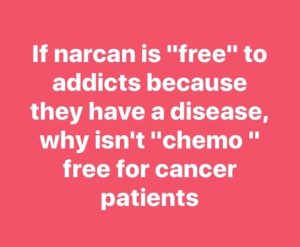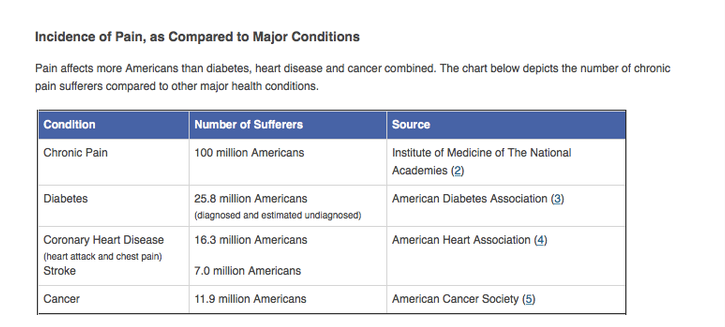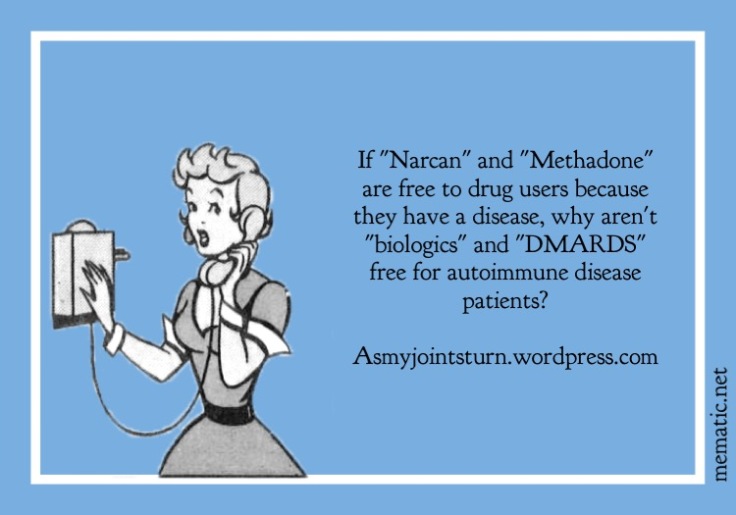I’m going out on a limb. I may be controversial with my stance, but I am taking it. I see all the programs out to help people with opioid addiction. I’ve also seen memes asking why Narcan (a drug that reverses opiod overdoses) is free while chemo isn’t free for cancer patients.  Now drug addiction is a horrible thing and it is impacting millions of people and their families. I’ve cried reading the obituaries of young people who lost their battle with addition. It’s all very tragic. I agree things need to be done to reduce these statistics. According to the American Society of Addiction Medication (2015)
Now drug addiction is a horrible thing and it is impacting millions of people and their families. I’ve cried reading the obituaries of young people who lost their battle with addition. It’s all very tragic. I agree things need to be done to reduce these statistics. According to the American Society of Addiction Medication (2015)
- Of the 20.5 million Americans 12 or older that had a substance use disorder in 2015, 2million had a substance use disorder involving prescription pain relievers and 591,000 had a substance use disorder involving heroin.
20.5 million is a lot of people.
Now let us look at the statistics of people who are living in chronic pain.
- In 2011, Congress commissioned an IOM (Institute of Medicine) report on people living in pain. According to that report, 100 million people in the United States live with chronic pain. Let’s look at that statistic again. 100 million people living with chronic pain. That is way higher that the 20.5 million people living with substance abuse.
100 million people is a LOT of people.

Do I know people who are addicted to pain meds? Yes. Many people in the chronic life/rheumatology communities have pain way more intense than mine. They take strong drugs like morphine and oxycodone that may cause addiction. Why do they take it? For quality of life. Living in pain is horrific. It’s exhausting and life altering. Pain medication is the only way some of us actually can function as human beings. Are they all addicts? No. Often there are no other treatments for people living in pain. Little research is done for conditions like osteoarthritis. Patients are told to take pain medication until they get down to bone-on-bone destruction of joints and they become eligible for a joint replacement. There is no other good long-lasting treatment. Everything is a temporary fix.
Often patients living in pain have little option for treatment. Insurance doesn’t cover anything that may be considered experimental or high tech devices that are not considered “medically durable equipment” (like TENS units, etc). As I have said a million or so times before, being sick is not cheap. (I may be exaggerating with a million, but I’m probably close). Plus, there is a stigma of living in pain. A lot of people see chronic pain sufferers as hypochondriacs, lazy, or drug abusers. As a community, we are so misunderstood.
So my question is: Why are 100,000,000 people living in chronic pain being treated as 2nd class citizens? Why are politicians like Trump and Christie starting programs to address the needs of opiod addiction, but ignoring the fact that 5x as many citizens have chronic pain due to various illnesses and injuries? Where are the programs that help people living in serious pain get support, access to treatment, and medications that help them get off of pain medication? Where is the funding for patients to use alternative treatments like physical and occupational therapy, acupuncture, and technology to combat their suffering? There is no way that some out of the 100 million people in chronic pain do not become addicted to pain meds. Why aren’t we looking at all the sources of how addiction starts?
People living in chronic pain are seen as “drain on the system” in terms of insurance, medical cost, and disability (medicaid). We live in a reactive society where illness is often treated with bandaids because there are programs like step therapy in place that prevent more costly and possible effective treatments from being implemented at early stages of disease onset. If you ask me, insurance companies are a big reason why opiod addiction is soaring. Insurance will cover pain medication and reject other treatments. It’s the easy and cheap solution when auxiliary treatments are so expensive. ****It should be noted that there is limited treatment programs covered by insurance for mental illness, PTSD and many other conditions that lead people to self-medicate with drugs. Insurance likes quick fixes.
So now I ask. What about people living in chronic pain? Where are the programs for people living with painful, debilitating autoimmune diseases who struggle daily to get by, and now their access to their pain medication is in jeopardy? Where is the political support for depression and suicide prevention that often coexist with chronic pain? Where is the funding for more research to cure these diseases and to fix these injuries? What about all 100 million of us?


This is perfect! I completely agree. I don’t like the way strong pain meds (tramidol) make me feel. It increases the brain fog already caused my the pain. I’m able to sleep, sure. But, I feel dopey the next day. Every point you made hits home and you are so right. Part of it, I think, is the stigma attached to autoimmune/chronic pain sufferers. And, that is why many of those 100 million people don’t seek proper help. “What would so-and-so think if they saw me popping a tramidol? Better put on the happy mask, push through the day, and cry when I get home.”
LikeLiked by 1 person
So true! People hide their pain because of the stigma of pain.
LikeLike
Exactly. I’ve been accused of faking my condition by a particularly nasty troll at work. She sees my swollen knee and how it’s hard to walk sometimes. Before I went for my last cortisone injection (speaking of temporary relief), I used a cane. And coworkers came to me saying she was still running her mouth.
LikeLike
I often avoid using my cane at work b/c of gossip. I already fear people think I am a hypochondriac.
LikeLike
I didn’t have a choice about that til I got the injection. Cane or call off.
LikeLike
When we think about opioid it is not, by and large, the chronic community who is fueling the issue. I think that is what is so awful. If I need the opioids, you can bet I am not selling or giving them away.
LikeLiked by 1 person
I think the statistics make that clear. I myself have had friends say things like “Aren’t you afraid of becoming addicted?” If they only knew how bad the pain was, they would never ask that question.
LikeLike
Interesting take and I think you articulated your points very rationally 🙂 I’m not from the U.S. so I don’t really know what the situation on the ground is like. I come from a country where drugs are a very iffy issue (death penalty for smuggling drugs in). I used to just bear with my chronic pains and mental side effects, thinking it was normal. They seem to be reaching a better awareness these days, but there’s nothing like percocet, oxycodone, etc here (I only ever had that when I had heart surgery in the U.S.). The only opioids here used are tramadol, codeine and morphine (and this, mostly in hospital). I’m only mentioning it cos I’m really curious as to the societal aspects and impact on patients like us in such contrasting cultures 🙂
LikeLike
Thanks for commenting. It is very interesting to look at the issue globally to see how people are impacted across the world.
LikeLike
This! Yes, this! This is what people need to hear!
Personally, I think you’re lucky. At least the pain meds worked for you. There are those of us that pain meds literally don’t work for.
But Congress needs to hear this!
I believe the insurance does it purposefully though. If you’re healthy, they don’t make money off of you. But if you’re too sick, they loose money on you. They want you just the right amount of sick…
LikeLiked by 1 person
I couldn’t have put it better myself regarding insurance!! I know I am luckier than many. I have a ton of pain but tramadol helps me function.
LikeLike